A noun phrases is a phrase that functions in the same way as a noun and always includes either a noun or an indefinite or a subject pronoun and words that modify it. A noun phrase can serve as a subject, direct object, or complement, which always follows a linking verb. Linking verbs include 'become,' 'seem,' and any form of 'be.' Noun phrases offer a concise way to include additional information in a sentence. One of Pearson's free sample resources to download happens to be this worksheet on expanding noun phrases.
It includes helpful terminology, activities and ideas for spotting expanded noun phrases in reading and and using them in writing. A noun phrases is a phrase that functions in the same way as a noun. A noun phrase always includes a noun, which is a person, place, or thing; or a pronoun, which takes the place of a noun. This pronoun can be a subject pronoun or an indefinite pronoun. Noun phrases also include words that modify the noun, or set it apart, so we know which noun we are talking about.
You might like to write the sentences in your yellow homework book and underline the expanded noun phrases. Once you have finished check your answers using the answer sheet . Learn about noun phrases, which are phrases that act as complete nouns. Discover the use of nouns, indefinite pronouns, or subject pronouns in noun phrases. Explore the use of noun phrases in subjects, direct objects, and complements of sentences.
Imagine that find yourself at the spooky house shown in the image, and write a passage to describe your time there. Make sure that you add extra detail by including expanded noun phrases in some of your sentences. Add an adjective and a prepositional phrase to nouns to create expanded noun phrases. In class this week, we are going to finish writing our first draft of our Skara Brae non-chronological report. We usually edit in a coloured pen but this is not essential.
For editing, we will look for the basics such as missing capital letters and full stops. We will then check for missing words or sentences that don't make sense. Once we have edited, we will then look at ways to improve our writing.
For example, if you have explain that - In 1850, there was a big storm... - we would try to up-level some adjectives and swap 'big' for a synonym, such as huge. To improve our writing further, we would also try to add in another adjective to form an even better expanded noun phrase. For example, if you had improved your writing to - In 1850, there was a huge storm... - you could go a step further by saying - In 1850, there was a huge, fierce storm...
They consist of adverb phrases, prepositional phrases and clauses. – the news is the subject argumentHave you heard the news? – the news is the predicative expression following the copula isThey are talking about the news. – the news is the argument in the prepositional phrase about the newsThe man reading the news is very tall. In writing, we will be writing sentences using expanded noun phrases. Watch this video as an introduction to what expanded noun phrases are.
Using and identifying expanded noun phrases is actually a year 4 objective but they are still very important in year 5 and 6 so today's work is a recap. None of you should find this too difficult and for those who find it easy, you should try to use rich and accurate vocabulary in your examples. Underline the longest possible noun phrase in each sentence.
Tick each of these sentences which include an expanded noun phrase. Underline all expanded noun phrases in the passage below. This bright, appealing PDF grammar worksheet is an excellent way to practise and revise using expanded noun phrases in Y4. This worksheet features a set of teaching tips and ideas to help aid the teaching of expanding sentences through the addition of noun phrases, adjectives and adverbs. We are going to recap on noun phrases and expanded noun phrases today.
This analysis of noun phrases is widely referred to as the DP hypothesis. It has been the preferred analysis of noun phrases in the minimalist program from its start , though the arguments in its favor tend to be theory-internal. By taking the determiner, a function word, to be head over the noun, a structure is established that is analogous to the structure of the finite clause, with a complementizer. Dependency grammars, for instance, almost all assume the traditional NP analysis of noun phrases. This practice takes the constellation to be primitive rather than the words themselves. The word he, for instance, functions as a pronoun, but within the sentence it also functions as a noun phrase.
The phrase structure grammars of the Chomskyan tradition are primary examples of theories that apply this understanding of phrases. Other grammars such as dependency grammars are likely to reject this approach to phrases, since they take the words themselves to be primitive. It's not unusual for nouns and noun phrases to be embedded within noun phrases.
Looking at the last example, "courage" and "word" are both nouns, but they are not the head nouns of the phrases. They are both objects of the preposition "of," sitting in prepositional phrases that modify the head nouns. Are and think about how these could be added to nouns to make expanded noun phrases. Here, Rebecca Jakes offers four activities, plus some additional tips, on teaching expanded noun phrases in KS2.
Watch this VIDEO to explain noun phrases and expanded noun phrases further. Noun phrases are groups of words that function like nouns. Typically, they act as subjects, objects or prepositional objects in a sentence. While that might seem tricky to grasp, the best way to understand these useful phrases is to see them in action.
Get a clear idea of a noun phrase and how it is used in a sentence through examples. Go through this powerpoint first to remind you what expanded noun phrases are. In this lesson you have learnt about expanded noun phrases and written some of your own. What is the Difference Between Noun Phrase and Adjective Phrase?
A noun phrase is a phrase that acts as a noun whereas an adjective phrase is a phrase that acts as an adjective. Thus, an adjective phrase modifies a noun while a noun phrase functions as an object, subject or complement in a sentence. They must function within another sentence pattern, always as nouns.
A noun clause functions as a subject, subject complement, direct object, or object of a preposition. A noun clause usually begins with a relative pronoun like "that," "which," "who," "whoever," "whomever," "whose," "what," and "whatsoever." A noun phrase includes a noun—a person, place, or thing—and the modifiers which distinguish it. Ones that come before might include articles, possessive nouns, possessive pronouns, adjectives, and/or participles.
Complements come immediately after the head in a noun phrase. They are prepositional phrases or clauses which are necessary to complete the meaning of the noun. Without the complement, we wouldn't understand what the noun was referring to. The allowability, form and position of these elements depend on the syntax of the language in question. In English, determiners, adjectives and noun modifiers precede the head noun, whereas the heavier units – phrases and clauses – generally follow it.
This is part of a strong tendency in English to place heavier constituents to the right, making English more of a head-initial language. Head-final languages (e.g. Japanese and Turkish) are more likely to place all modifiers before the head noun. Other languages, such as French, often place even single-word adjectives after the noun. An expanded noun phrases makes the noun sound more interesting. No matter their form or function, noun phrases form fuller ideas. Instead of just talking about a dog, you can add an adjective to that noun and discuss a spotted dog.
Instead of just saying they walked into the sunset, you can describe the scene with his laughter ringing through the air. You'll find many writers like to make use of noun phrases. It allows them to paint pictures, including a red-faced woman who found herself in an uncomfortable position. Pupils should be taught to use expanded noun phrases to describe and specify . Check how well you understood the videos by highlighting all the expanded noun phrases.
This Prezi presentation helps explain how expanded noun phrases can be used to convey complicated information concisely. This review mat for Grammar, Punctuation and Spelling is an excellent way to revise and practise using expanded noun phrases. A noun phrase, or nominal , is a phrase that has a noun as its head or performs the same grammatical function as a noun. Noun phrases often function as verb subjects and objects, as predicative expressions and as the complements of prepositions.
A noun phrase, dependent words before the head are either determiners (e.g. the, my, some) or premodifiers (e.g. adjectives). Dependent words after the head are either complements or postmodifiers. The representation of noun phrases using parse trees depends on the basic approach to syntactic structure adopted.
The layered trees of many phrase structure grammars grant noun phrases an intricate structure that acknowledges a hierarchy of functional projections. Some examples of noun phrases are underlined in the sentences below. 1) A expanded noun phrase is 2 adjectives and a noun like a golden,yellow windows. An expanded noun phrase effects our writing when the reader enjoys the brilliant adjectives that describes the noun. 1)An expanded noun phrase adds more detail to the noun by adding one or more adjectives.
It's an effective way to include additional descriptive information without being too wordy. Expanded noun clauses are a good way to add succinct and useful descriptions to a sentence. These subheadings should also be snappy as you don't want your subheading to be longer than the paragraph! Information texts also have pictures and a caption to describe each of them.
Ideally, they should be next to or near the paragraph they relate to. Finally, this kind of text finishes with a conclusion that can tell the reader where they can find extra information about the subject. The reading comprehension sheets from the previous activity are a perfect example of what this kind of information text might look like. For more information about the structure of noun phrases in English, see English grammar § Phrases. The subject noun phrase that is present in this sentence is long.b.
Noun phrases can be embedded in other noun phrases.b. They can be embedded in them.A string of words that can be replaced by a single pronoun without rendering the sentence grammatically unacceptable is a noun phrase. As to whether the string must contain at least two words, see the following section. In some more modern theories of grammar, noun phrases with determiners are analyzed as having the determiner as the head of the phrase, see for instance Chomsky and Hudson . An expanded noun phrase a phrase of 3 words 2 adjectives and a noun. The most incredible place materialised before Harry's eyes it was a haunted scary castle with bright shining windows.
Harry could see small spooky boats heading towards him as slow as snails. The dark night sky made Harry nervous because he couldn't see what was happening. 1) An expanded noun phrase is 2 adjectives and a noun put together in a sentence. Given the English language's complex beauty, you may not be surprised to learn there are other types of phrases, including verb phrases and gerund phrases. Investigate phrase examples to learn more about building illustrative sentences that will stick in your readers' minds forever.
Children may be asked to look through a text and underline all the noun phrases or prepositional phrases they can find. Great Job - Have a go at writing your own sentences with an expanded noun phrase. There's a PowerPoint to try expanding noun phrases as a class and then there are two printable PDF activities – one on describing dragons and one for writing about animals. This article runs through expanding noun phrases and includes three downloadable activities to try in class. Noun phrases can be embedded inside each other; for instance, the noun phrase some of his constituents contains the shorter noun phrase his constituents. A noun phrase, or nominal , is a phrase that has a noun or pronoun as its head or performs the same grammatical function as a noun.
Noun phrases are very common cross-linguistically, and they may be the most frequently occurring phrase type. I have used a expanded noun phrase in the setting description of Narnia. An expanded noun phrase can make the word more excited and interesting. An expanded noun phrase is 2 adjectives that describes a noun. An expanded noun phrase is when two adjectives describe a noun.
An expanded noun phrase is one or two adjectives and a noun. A expanded noun phrase is 2 or 3 adjectives that describe a noun . An expanded noun phrase is 2 adjectives that describe a noun at the end.
A expanded noun phrase is two nouns and one adjective. An expanded noun phrase is two adjectives that describe a noun. The noun phrase answers the question, "Who did Trudy give the bottle to? " The phrase 'her hungry, crying baby' is the indirect object because it receives the bottle ('a bottle' is the direct object because it is receiving the action 'gave'). The noun 'children' is modified by the determiner 'all'.








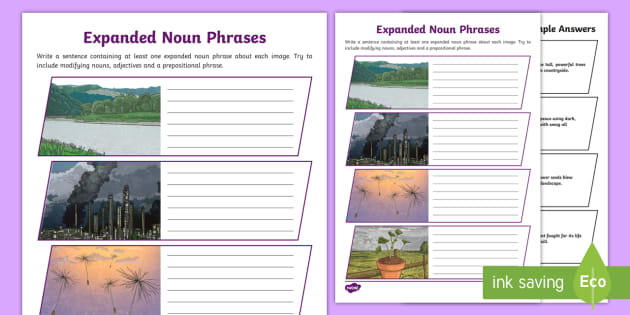

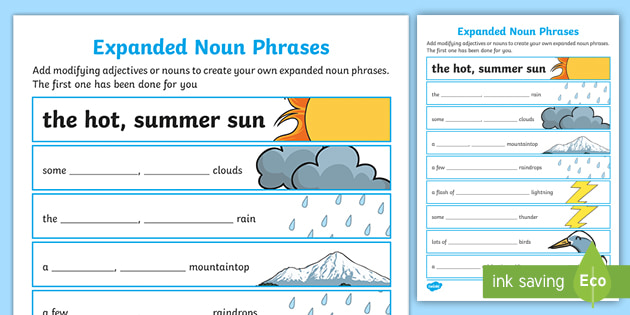
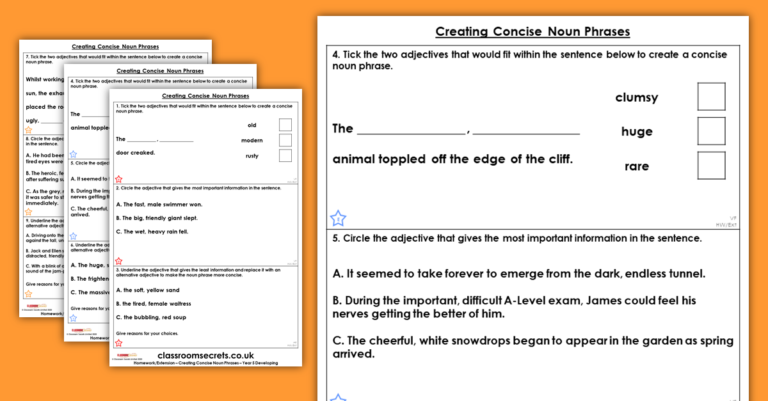

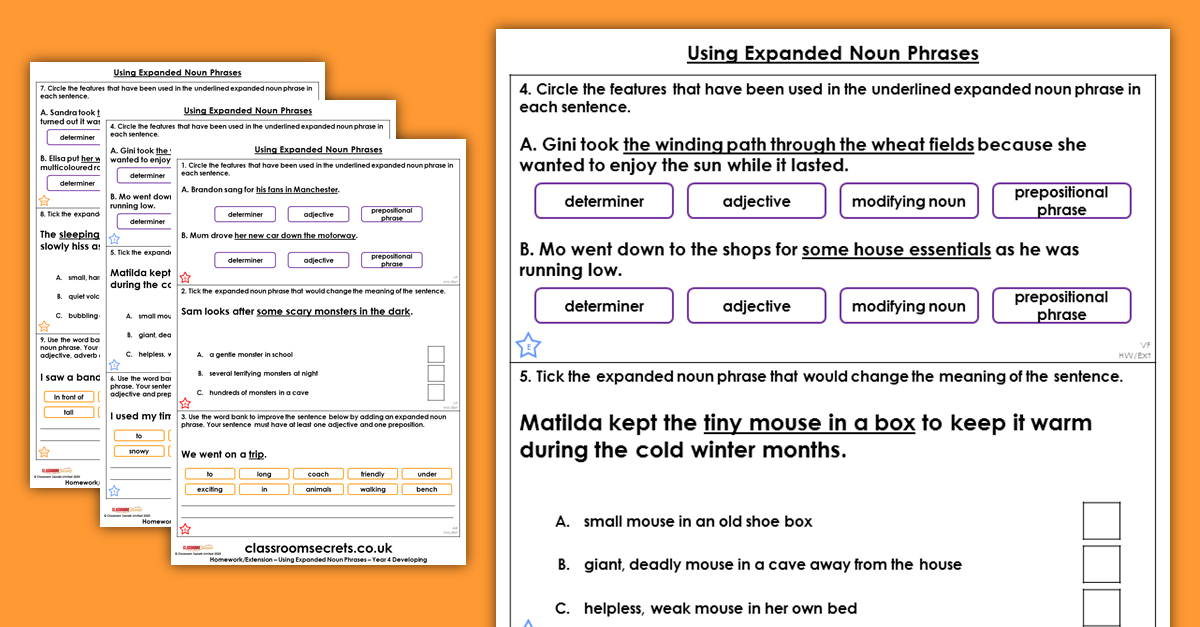




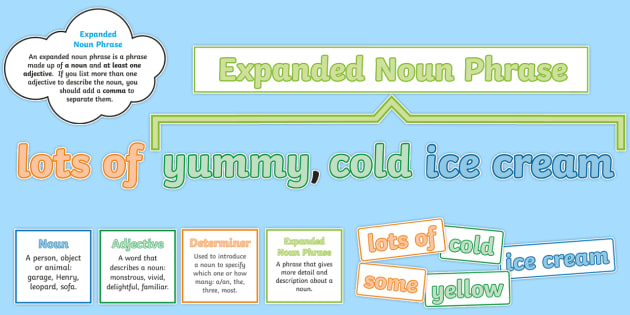




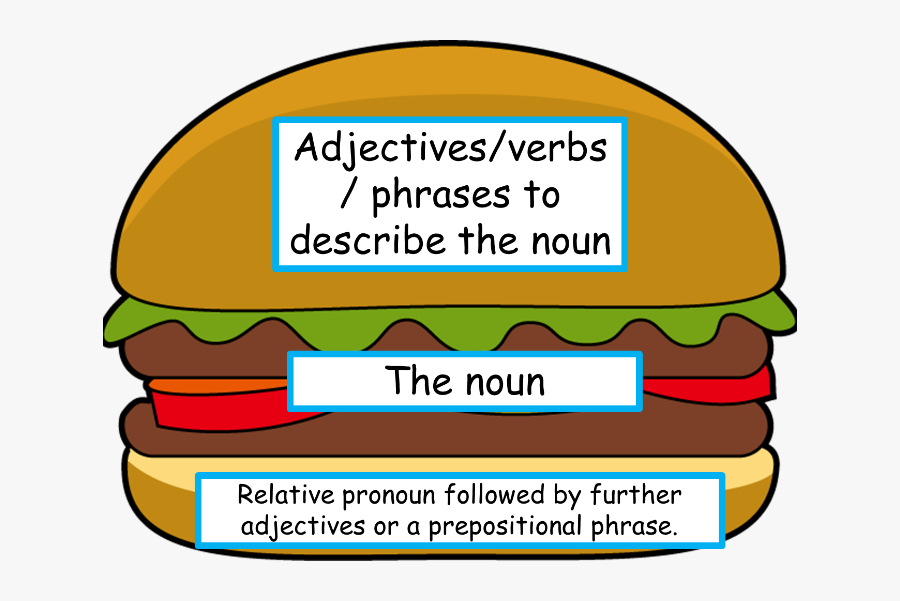



No comments:
Post a Comment
Note: Only a member of this blog may post a comment.